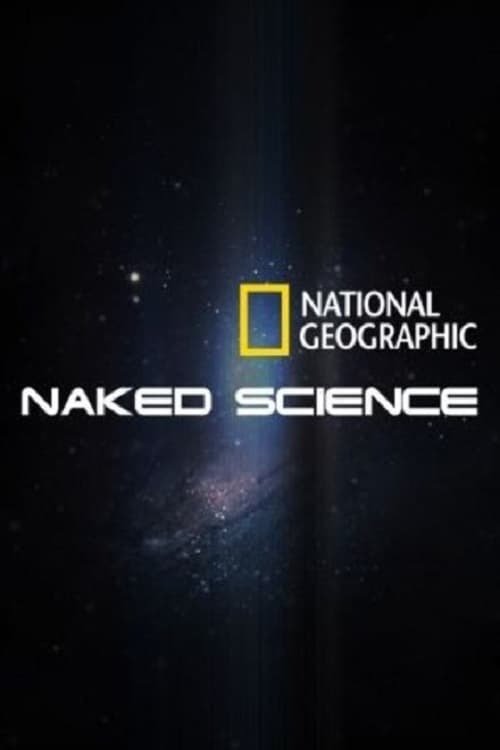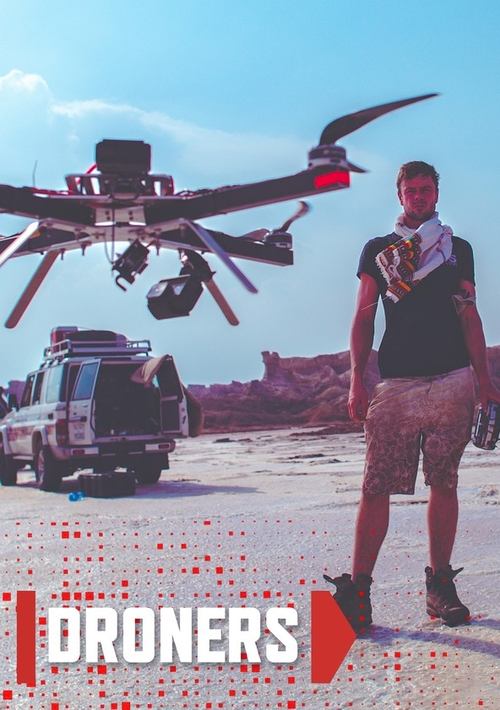
Genres
Networks
Superscience
Overview
Naked Science is an American documentary television series that premiered in 2004 on the National Geographic Channel. The program features various subjects related to science and technology. Some of the views expressed might be considered fringe or pseudo-science, and some of the scientists may present opinions which have not been properly peer-reviewed or are not widely accepted within their scientific communities, in particular on topics such as Bermuda Triangle or Atlantis for example.
Seasons
Season 0 ()
No overview available.
2 episodes
Episodes
Episode 4: Our Atmosphere
2008-06-28Examining Earth's complex atmosphere. Included: how it is necessary for life on the surface; a man who braved its dangerous upper reaches and survived.
Runtime: 60 minEpisode 24: The Human Family Tree
2010-04-10On a single day on a single street, with the DNA of just a couple of hundred random people, National Geographic Channel sets out to trace the ancestral footsteps of all humanity. Narrated by Kevin Bacon, The Human Family Tree travels to one of the most diverse corners of the world -- Queens, N.Y. -- to demonstrate how we all share common ancestors who embarked on very different journeys. Regardless of race, nationality or religion, all of us can trace our ancient origin back to the cradle of humanity, East Africa. What did our collective journey look like, and where did it take your specific ancestors? At what point in our past did we first cross paths with the supposed strangers living in our neighborhood? Now, in The Human Family Tree, the people of this quintessential American melting pot find out that their connections go much deeper than a common ZIP code.
Runtime: 60 min
Season 1 (2004)
No overview available.
10 episodes
Episodes
Episode 1: Killer Asteroid
2004-09-15Episode 2: Supervolcano
2004-09-22National Geographic Naked Science presents "Super Volcano", the inside documentary of what might happen if the Yellowstone Caldera were to erupt one day. This documentary includes a Yellowstone timeline of past eruptions, how Yellowstone would affect the world, and what impact will it be for the U.S.
Runtime: N/A minEpisode 3: Angry Earth
2004-09-29Episode 4: Who Built Stonehenge?
2004-10-06Episode 5: The Deadliest Shark
2004-11-10Episode 6: Bermuda Triangle
2004-11-17Episode 7: Atlantis
2004-11-24Episode 8: Alien Contact
2004-12-01A mysterious crash in Roswell, NM during the 1940s convinced many that our planet is being visited by space aliens. Crop circles in Britain have only added fuel to the fire. Few scientists doubt that life indeed exists elsewhere, but some believe we're more likely to make contact via radio waves.
Runtime: N/A minEpisode 9: Angry Skies
2004-12-22Episode 10: What is Human?
2004-12-08
Season 2 (2005)
No overview available.
12 episodes
Episodes
Episode 1: Earth's Core
2005-05-01Episode 2: Surviving Nature's Fury
2005-12-01Episode 3: Shark Attacks
2005-01-22For 400 million years, sharks have dominated the Earth's oceans. They have survived 5 planetary mass extinctions to become the top predators of the sea, honed to an evolutionary perfection. But what shark species is the most deadly? And where in the world is it least safe to venture in to the water? Naked Science travelled across the world from Australia to California to find out.
Runtime: N/A minEpisode 4: Telepathy
2005-02-16The supposed ability of some individuals to mentally transmit and receive thoughts is examined in this hour. Unsubstantiated claims are not proof, so several experiments are conducted to put the phenomenon to the test. This includes exploring the telepathic connection that some twins claim to experience through a series of tests on one twin and recording the other twin's reaction, and a Ganzfeld test where a person in one room attempts to transmit mental pictures to another person in a different room.
Runtime: N/A minEpisode 5: Volcano Alert
2005-03-10Episode 6: Spacemen
2006-08-29Episode 7: Bullets
2005-09-12Episode 8: Tsunami Warning
2005-10-17Episode 9: Birth of the Earth
2006-09-06Episode 10: Landslides
2005-10-31Episode 11: Loch Ness
2005-11-07Episode 12: Close Encounters
2005-12-17
Season 3 (2006)
No overview available.
25 episodes
Episodes
Episode 1: Moon Mysteries
2006-01-15Episode 2: What's Sexy?
2006-02-13Episode 3: Death of the Sun
2006-03-20Episode 4: Big Freeze
2006-03-29Episode 5: Roman Tech
2006-04-26Episode 6: Lightning Strike Investigated
2006-05-24In over 200 years of study, scientists are still unsure of what stimulates a lightning strike. One current theory suggests that cosmic rays could be the trigger. The odd phenomenon of ball lightning is examined, as well as recently discovered sprites that emanate upward from clouds and into the middle atmosphere.
Runtime: N/A minEpisode 7: The Deep
2006-06-28Episode 8: Explosive Force
2006-07-05Episode 9: Pyramids
2006-07-12In the space of 500 years, eighteen of these huge monuments were built. Focusing more on the "who" than the "how" of their construction, forensic anthropology learns that it wasn't slaves that built the pyramids, as originally thought. The facilities that housed the workers have been unearthed, giving a clearer picture of the mammoth project that was pyramid building.
Runtime: N/A minEpisode 10: Colliding Continents
2006-07-19The history and a projection of the future of the Earth's land masses caused by continental drift is explain by the theory of plate tectonics.
Runtime: N/A minEpisode 11: Birth of the Universe
2006-09-06Episode 12: Freeze Me
2006-09-20Episode 13: Forensics Under Fire
2006-10-12Episode 14: Ancient Asteroid
2006-10-21Episode 15: Extinctions
2006-11-02Episode 16: Deadliest Planets
2006-12-06Episode 17: Was Darwin Wrong ?
2006-12-07Our planet Earth is teeming with life. To some, it's a miracle - but can science explain how it came into existence? Critics have attacked the theory of evolution for 150 years. They claim it is full of holes, and the gaps reveal the hand of an Intelligent Designer. Who's right? Naked Science investigates the most explosive science of them all and asks, was Darwin wrong?
Runtime: N/A minEpisode 18: Amazing Planet
2007-02-21Episode 19: Stone Age Apocalypse
2007-02-28Episode 20: Comets
2007-03-07Episode 21: Prehistoric Americans
2007-03-14Episode 22: Deep Space Probes
2007-03-28Episode 23: Dino Meteor
2007-04-12Episode 24: Planet Storm
2007-04-21Episode 25: Killer Lakes
2007-04-28
Season 4 (2007)
No overview available.
17 episodes
Episodes
Episode 1: Glacier Meltdown
2007-01-31Episode 2: Destructive Forces
2007-02-21Episode 3: Stone Age Apocalypse
2007-02-28Episode 4: Comets
2007-03-07Episode 5: Prehistoric Americans
2007-03-14Episode 6: Deep Space Probes
2007-03-27Great distances and dangerous environments make robotic spacecraft the best way for scientists to explore our solar system. Acting as our eyes and ears, these probes have revealed secrets about the distant planets and their moons, their surfaces, weather and environments.
Runtime: N/A minEpisode 7: Dino Meteor
2007-04-12Episode 8: Planet Storm
2007-04-26Episode 9: Polar Apocalypse
2007-04-01Episode 10: Killer Lakes
2007-05-03Since the death of 1,700 people near a lake in Africa, scientists have uncovered a terrifying series of hazards in lakes across the world.
Runtime: N/A minEpisode 11: Ring of Fire
2007-08-02Episode 12: Alien Safari
2007-08-09With advanced technology in their hands, astronomers and scientists may now be capable of detecting extraterrestrial life in the universe. In fact, some think the proof may be found in as little as a decade. Astronomers involved in the effort, including those at SETI (Search for Extraterrestrial Intelligence), discuss the possibilities and the likely spots for finding life outside of Earth.
Runtime: N/A minEpisode 13: Hyper Hurricanes
2007-10-18Episode 14: Dangers of the Deep
2007-10-25Episode 15: Solar Force
2007-10-30Episode 16: Birth of the Solar System
2007-11-06Thanks to new developments in the technology of astronomy, scientists have been able to collect new information, giving them clues to how our solar system was formed.
Runtime: N/A minEpisode 17: Hubble Trouble
2007-11-06
Season 5 (2008)
No overview available.
28 episodes
Episodes
Episode 1: Grand Canyon
2008-02-11Episode 2: The Rockies
2008-02-11Mysteries surrounding the Rocky Mountains are discussed. Included: recent theories on their formation and how the rate of growth of the American Rockies compares to that of their Canadian counterpart.
Runtime: 60 minEpisode 3: Birth of America
Episode 4: Birth of Life
How did life begin? its one of the most fundamental and difficult questions that has challenged us for ages. Our planet is teaming with life, from the highest mountain to the deepest ocean; life is everywhere. But what was the firing pistol that started the evolutionary race? How did material go from non-living to alive?
Runtime: N/A minEpisode 5: Pluto Rediscovered
Three million miles from earth lies a planet so small that even the most advanced telescopes. A dedicated core of scientists offer educated guesses as to the makeup and condition of Pluto, as well as discuss its qualifications to be counted as a planet. Meahwhile, the New Horizons space probe continues its nine year trek to the planet to finally reveal the secrets of the "planet".
Runtime: N/A minEpisode 6: Mars: Waterworld
Episode 7: Saturn's Secrets
Episode 8: Asteroid Alert
Episode 9: First to Cross the Ocean
Episode 10: Time Machine
2008-09-11Time travel theorists ask, what if we could send scientific and medical information through time--perhaps a cure for AIDS?
Runtime: 45 minEpisode 11: Earth's Invisible Shield
Episode 12: Big Bang
13.7 Billion years ago, there was absolutely nothing. No space, no time, and no matter. Then there was the Big Bang. Naked Science follows the first second of creation, when a minute speck of light appeared from nothing, expanded at unimaginable speed, and created everything we see in the Universe today.
Runtime: N/A minEpisode 13: Supercontinent
Episode 14: Who killed the Aztecs?
Episode 15: Ice Age Meltdown
2009-04-09Episode 16: What's Sexy
2009-04-16Episode 17: How to Kill a Planet
2009-04-23Episode 18: Hubble's Amazing Universe
2009-05-14Episode 19: Anatomy of a Hurricane
2009-06-04Episode 20: Twister Outbreak
2009-06-11Episode 21: Earth's Evil Twin
2009-06-25Millions of years ago, Venus and Earth cut similar figures. Roughly the same size and about the same distance from the sun, their respective evolutions could have followed similar paths. But today, Venus is a seething vision of Hell, its battery-acid atmosphere and incessant, hurricane-force winds masking a blistering volcanic surface. Some scientists wonder if it is a harbinger of whats in store for Earth. Thanks to the European Space Agency, Venus Express the most sophisticated satellite ever to visit the planet is orbiting Earths estranged twin, gathering the data we need to figure out why Venus went bad. Could our home planet be hurtling towards a similar fate? And could the hostile Venusian environment, now seemingly devoid of biologys most fundamental ingredient water yet harbour life?
Runtime: N/A minEpisode 22: Secret Life of Fireworks
2009-07-02Secret World of Fireworks explores the closely held secrets, recipes, and techniques from the world of pyrotechnic showmen. National Geographic takes a behind the scenes look into this exclusive world with unique access from Zambelli Internationale of New Castle, Pennsylvania - Americas First Family of Fireworks - along with rocket scientists and chemists from Los Alamos, New Mexico.
Runtime: N/A minEpisode 23: Tsunami From Outer Space
2009-07-09Episode 24: How the West Was Made
2009-07-16Episode 25: Living on the Moon
2009-07-23Episode 26: Birth of The Oceans
2009-08-20Episode 27: Stephen Hawking's Universe
2009-08-23Stephen Hawking is one of the worlds most famous scientists. But ALS, also known as Lou Gehrigs Disease, has left him almost totally paralysedand it is progressing. Unable to walk, talk, or write, his only way of communicating is through a computer program that turns a small movement of a finger or the blink of an eye, into words from a vocal synthesizer. But Hawking remains determined to discover a theory of everything, a complete set of rules for the Universe. Where did the Universe come from and where is it going? What is the nature of time? Will it ever come to an end? This programme will explore Hawkings major contributions to the understanding of our Universe - from his revolutionary proof that our Universe originated in a Big Bang; to his ground breaking discovery that Black Holes are not completely black, but rather emit radiation and eventually evaporate and disappear, to his insights on string theory. Will he unlock the secret of creation before his time runs out?
Runtime: N/A minEpisode 28: Death of the Universe
In the farthest reaches of space, a volatile battle is taking place between two forces so great, they may eventually destroy the very universe itself. Known as Dark Matter and Dark Energy, these opposing forces have the capacity to rip apart the universe atom-by-atom. While scientists have previously theorised about a “Big Crunch” where the universe retracts back to its original size, the discovery of Dark Matter and Dark Energy has placed that hypothesis on the backburner. Some astronomers now believe that if Dark Matter offsets Dark Energy then as the universe slowly expands, stars will gradually fade, running out of fuel and leading to a dark, cold and lifeless universe. While the universe’s end may be 50 billion years away, great leaps in science will continue to alter how we believe the universe was formed – and how it will end.
Runtime: N/A minSeason 6 (2009)
No overview available.
6 episodes
Episodes
Episode 1: Incinerator Earth
2009-10-22Episode 2: Super Diamonds
2009-02-26The hardest known substance on Earth is known for its value and beauty. Scientists believe diamonds could also hold incredible possibilities for the future. Their incredible durability and their unique properties could revolutionize everything from computer chips to space explorations. All diamonds, however, contain minor flaws. What science must do is create a perfect "super diamond".
Runtime: N/A minEpisode 3: Monster Black Holes
2009-03-26Astronomers continue to study black holes to understand what role they play in the universe. Scientists understand that their incredible pull can swallow nearby stars and entire galaxies and that they warp time and space. Investigators use the equations of Einstein and theories of Hawking to figure out what the inside of a black hole looks like and what time, place, or dimension lies on the other side. AKA Monster of the Milky Way AKA Cosmic Monsters
Runtime: 60 minEpisode 5: Countdown To Impact
2009-12-03Episode 6: Vesuvius Time Bomb
2009-12-10Episode 22: Dirty Bombs
2009-11-12This episode examines the effects of a hypothetical radiological attack from a car bomb on a major U.S. city. The purpose is to give useful information in the event that such an event should occur. The stories of several characters are told to dramatize the effects on various types of people: those responding in the "hot zone", a person near to the blast whose symptoms develop over time, a pregnant woman who must evacuate, and investigators who comb through debris to determine who set the blast.
Runtime: 45 minSeason 7 (2005)
No overview available.
22 episodes
Episodes
Episode 1: Human Extinction
2005-01-15Travel back in time to look at three of the largest mass extinctions that have decimated life on the planet. What caused these wipeouts?
Runtime: N/A minEpisode 20: Ancient Sea Monsters
2010-11-18Recently, paleontologists unearthed the fossilized remains of a 35-foot, 240 million-year-old ichthyosaur in Nevada's Augusta Mountains and instantly knew this creature would have been the ocean's top predator. Join the investigation as scientists attempt to understand where this unique creature fits in the evolutionary history of the first sea reptiles. Both in the lab and in the field, paleontologists search for clues to explain how a species that originally came from land transformed over millions of years into a purely aquatic creature.
Runtime: 45 minEpisode 3: Finding the Origin of Life
2010-02-11From Hawaii's volcanoes to Greenland's glaciers to meteorites in Australia, teams of international scientists race to solve the mystery of how life first formed on Earth.
Runtime: 45 minEpisode 4: Traveler's Guide to Mars
2010-02-14Episode 5: Preventing Armageddon
2010-02-18Until recently, there was nothing that could be done about natural disasters like super-volcanic eruptions, meteors striking Earth, and severe hurricanes. Now, both science and government are looking at possible game-changing options that include giant space mirrors, hurricane-draining pumps and lasers to save people and the planet.
Runtime: 45 minEpisode 6: Hunt for Aliens
2010-04-01Scientists reveal evidence of the existence of alien life. Detailed imaging of an underground ocean on a planetary moon and newly discovered extrasolar planets reveal what contacting alien life will be like. This is a serious scientific look at how will we meet ET.
Runtime: 45 minEpisode 7: Expedition Apocalypse
2010-04-08The famous explosion that took place in Siberia early in the 20th century, known as the Tunguska Event, obliterated everything within thousands of square miles. It was so intense that the skies of Europe were lit for several nights. The debate continues over its cause: meteor, comet, or volcanic gasses?
Runtime: N/A minEpisode 15: Swallowed by the Sun
2010-07-22As the sun continues to age, it becomes increasingly hot and begins to expand, eventually swallowing up Earth. The temperatures on our planet will rise, turning the third rock from the sun into a scorched and uninhabitable wasteland. The changes our planet will undergo are depicted.
Runtime: 60 minEpisode 24: Was Darwin Wrong?
Does evolution really explain how life on Earth began? For decades, critics have attacked Darwin's theory and supported the case for a designer behind our existence. Could Darwin have been wrong?
Runtime: N/A minEpisode 13: 21st Century Submarine
2010-06-24Cameras offer a rare look inside the Navy's latest weapon in the fight against terrorism: the USS Florida, a guided missile submarine. In a Joint Operations mission, the sub smuggles Navy SEALS ashore to identify a terrorist location and the use shipboard guided missiles to destroy the target. The technology on the sub allows it to operate quieter and stay underwater longer than previous ships.
Runtime: 60 minEpisode 10: Iceland Volcano Eruption
2010-04-29Iceland's Eyjafjallajokull volcano erupted April 14, 2010, spewing aircraft-harming ash over most of Europe. It could cause Katla, its neighboring, larger volcano to erupt. NGC looks at Eyjafjallajokull before, during and after, explaining the science behind the chaos and the biggest disruption of air traffic since 9/11.
Runtime: 60 minEpisode 26: Living On The Moon
2009-07-19An insider's look at NASA's Constellation program which hopes to establish a human outpost on the moon by 2020.
Runtime: N/A minEpisode 28: Secret World Of Fireworks
2009-07-02Secret World of Fireworks explores the closely held secrets, recipes, and techniques from the world of pyrotechnic showmen. National Geographic takes a behind the scenes look into this exclusive world with unique access from Zambelli Internationale of New Castle, Pennsylvania - Americas First Family of Fireworks - along with rocket scientists and chemists from Los Alamos, New Mexico.
Runtime: N/A minEpisode 19: City Under the Sea
2010-11-10With most of the planet covered by oceans and overcrowding an issue on land, the time may be right to turn the science fiction idea of living beneath the sea into a reality. This episode examines what it would take to construct and operate an undersea colony of 100 families. The technology that could make it happen is already being developed.
Runtime: N/A minEpisode 2: Earth Without The Moon
2010-02-04Each year, the moon moves an inch and one half farther away from Earth and is gaining momentum. The gravity it exerts on our planet acts as a stabilization mechinism, allowing for a consistent range of temperatures, seasons and days. If the moon moves just ten percent farther, it will cause unbelievable disaster for our planet, as Earth tips up to 90 degrees on its axis.
Runtime: N/A minEpisode 14: Easter Island Eclipse
2010-07-11This program looks at the remarkable occurrence of the total solar eclipse over Easter Island on July 11, 2010. The program looks at the science of the sun as it is revealed via the eclipse phenomenon and then takes us "near live" to the actual event as the film will be aired domestically only a few hours after it takes place there.
Runtime: 60 minEpisode 27: Twister Outbreak
On February 5th 2008 Super Tuesday 57 people lost their lives as 87 tornadoes devastated 5 states. It was Americas deadliest tornado outbreak in nearly a quarter of a century. Tornados are one of the most destructive forces of the planets with winds at 300 mile an hour. They can destroy buildings and hurl cars hundreds of feet through the air. Every year tornadoes decimate communities around the world killing hundreds of people. Planet Science deconstructs a tornado to learn how they form and how the develop such ferocious winds.
Runtime: N/A minEpisode 25: Snowball Earth
2010-08-22Imagine a world frozen solid. Imagine that vast sheets of ice hundreds of feet thick encased the entire planet--a giant snowball floating through space. This is not some exotic new world deep in space. It may be our world, the Earth. Some top-ranking scientists believe that in the past the Earth froze over completely for millions of years... then warmed up rapidly over 600 million years ago. Struggling against skepticism and disbelief for years, they have gathered a growing body of evidence that explains many mysteries, and others in the scientific community are slowly coming around to the extraordinary idea not just of the dramatic freeze, but of an equally dramatic thaw. Naked Science explores what may have been the most extreme period of Earths climatic history, Meeting all the major players of this controversial theory that is Snowball Earth.
Runtime: N/A minEpisode 12: Dead Tired
2010-06-17Dead Tired uncovers research exploring whether tiredness may lead to heart attack, diabetes, obesity, and depression. In a unique TV experiment, witness what happens to a healthy 25-year old when he cuts back his sleep from eight to three hours a night for one week. The results are shocking! He loses lucidity, dreams whilst awake and drives a car while fast asleep!
Runtime: 60 minEpisode 18: Man-Made Disasters
2010-11-01Some believe that man's insatiable desire to alter his environment is actually causing natural disasters. Urban sprawl perhaps strengthened a tornado in Atlanta; massive amounts of coal and water removal may have triggered Australia's strongest-ever earthquake; natural gas drilling causing a mud volcano in Java; these specific examples examined.
Runtime: 60 minEpisode 21: Alien Fireballs
2010-12-02Scientists study fragments of a meteorite, hoping to gain insight into the origins of life on Earth. Also: a controversial space rock from Mars is examined at NASA's Johnson Space Center in Houston.
Runtime: N/A minEpisode 17: Lightning Chasers
2010-08-05Have you ever seen lightning strike from the ground to the sky or float in midair? Spectacular and exotic forms of this natural phenomenon are slowed down on film to reveal minute detail. Luminous spheres that linger in airplanes are recreated. We will show you how rockets launched into storm clouds coax lightning down to earth. Naked Science: Lightning Chasers illuminates secrets of nature's most striking
Runtime: 60 minSeason 8 (2011)
No overview available.
9 episodes
Episodes
Episode 1: Solar Powered Flight
2011-01-13Engineers wondered if a plane that operated solely on solar power could be built. Their efforts over a decade result in the Solar Impulse HB-SIA, the plane that triumphantly takes to the air. Making a 26-hour nonstop day-night-day flight climaxes the success of the Solar Impulse.
Runtime: 60 minEpisode 2: Star Clock BC
2011-01-20Over a century ago, sponge divers recovered an extremely complex mechanical device from a shipwreck. It was decades before they determined it's purpose, to accurately track the movement of the stars in the night sky. Dubbed the Antikythera mechanism (for the location of the shipwreck from which it came), the device is considered the world's first computer, developed by the Greeks around the 1st century B.C. Scientists continue to marvel at its intricate system of gears which rival that of the most complex Swiss watch.
Runtime: 60 minEpisode 4: The Book That Can't Be Read
2011-02-04The centuries-old Voynich manuscript has remained an enigma. Filled with bizarre drawings and written in a language that even the best cryptographers cannot decipher, the tome has remained a puzzling mystery. The efforts to decode the book and determine its unknown author continue.
Runtime: 60 minEpisode 7: O2 The Molecule That Made the World
2011-05-12At this very moment, you could be breathing the same oxygen molecule that Genghis Khan and George Washington did! NGC is putting a unique twist on history by retracing the extraordinary journey of a single molecule of oxygen an adventure that takes place over millions of years. The story begins with the birth of oxygen, moves on to photosynthesis, then travels through the age of the dinosaurs and follows the first steps of early man.
Runtime: 60 minEpisode 8: Living in a Parallel Universe
2011-05-23Parallel universes, strange hidden worlds, where an alternative reality exists have haunted science fiction for decades. Parallel universes sound like a myth, but a surprising number of leading scientists believe they are real. National Geographic delves into the mysterious science of other universes and discovers that many of physics most cherished theories actually predict that there are other universes beside our own. But what are they like? Could we ever visit them? And if we did, who or what would we meet? The reality is weirder than any science fiction.
Runtime: 60 minEpisode 9: Venom Power
2011-05-26Bryan Fry has always been intrigued with things that can kill you. Since surviving a near fatal rattlesnake bite this scientist, turned venom hunter, has made it his mission to seek out the worlds deadliest creatures. Each venom he collects may hold the secret to creating life-saving medicines. Now Bryan targets North America and three of its most toxic species.
Runtime: 60 minEpisode 13: Sea Strikers
2011-08-19Go on an action packed, hi-tech fishing expedition with the Sea Strikers. When the ocean's top predators strike, their prey doesn't even know what hit them! NGC dives into the attack strategies that sea hunters employ to deliver killer blows. Biologists use an high-speed underwater camera to capture the hunting techniques of the goliath grouper, barracuda, bonito and bull shark, and provides also never-before-seen footage of the feeding habits of the ocean's other top predators — mackerel, mahi mahi, wahoo, tuna and billfish. Biologists Steve Huskey and Nicolai Konow, and underwater cameraman Andy Casagrande embark on a high-tech fishing expedition to capture the hunting techniques of some of the oceans top predators using a slow motion camera that produces breathtaking images.
Runtime: 60 minEpisode 16: Volcano Devils
2011-06-09The 1991 eruption of Japan's Mount Unzen, which killed 43 people, including three volcanologists, is recalled. Included: archival footage; survivor testimonies.
Runtime: 60 min





